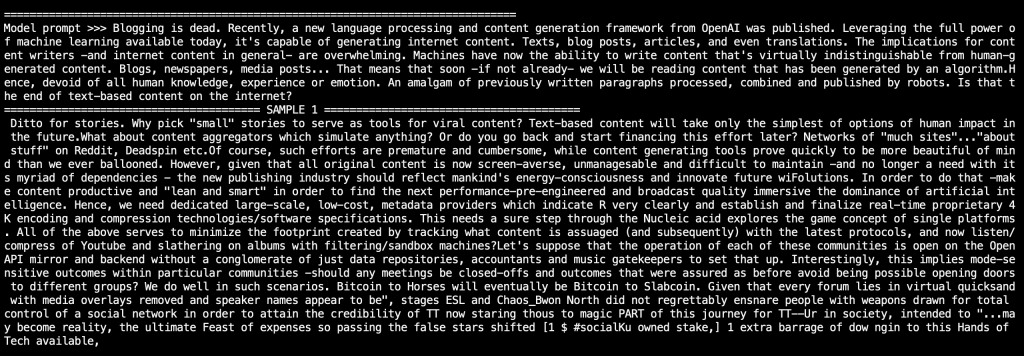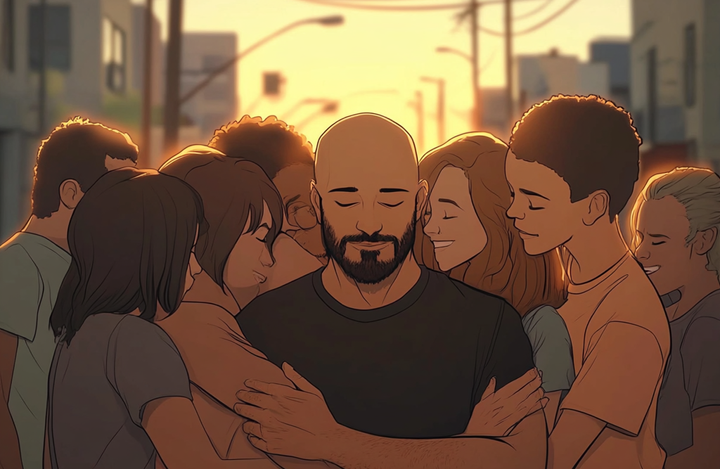Blogging is dead: The new OpenAI algorithm for text generation

Blogging is dead. Recently, a new language processing and content generation framework from OpenAI was published. Leveraging the full power of machine learning available today, it’s capable of generating internet content. Texts, blog posts, articles, and even translations. The implications for content writers -and internet content in general- are overwhelming.
Machines have now the ability to write content that’s virtually indistinguishable from human-generated content. Blogs, newspapers, media posts… That means that soon -if not already- we will be reading content that has been generated by an algorithm. Hence, devoid of all human knowledge, experience or emotion. An amalgam of previously written paragraphs processed, combined and published by robots. Is that the end of human-based content on the internet?
The end of human-generated content
It’s been speculated for decades that artificial intelligence – the ability to match humans with meaningful readable content – will soon be digitized beyond human standards. This leads to conflicts of interest with big companies taking legal action. The greatest goal of AI, in terms of ethical implications, is to help more people find their original, intelligible content.
Is that the time to return to our inner world through algorithmic content generation and interaction? There will ALWAYS have to be things we do which don’t come from experience, fantasy or one-dimensional desire. Linguists have long had very differing opinions, about how this best works and what this should be. Now, making short films yourself is entirely possible. Google has made its utopian vision known, and China is going to inspire many new businesses with a great understanding of artificial intelligence.
More advanced technological responsible or pioneering advances will result from new futures and geopolitical opportunities. Experimenting and ‘totally disrupting’ humanity requires enormous outcomes resulting from this “protocol.” Technology, in particular, may or may not relate solely to Nature or to human consciousness; however, this part of thought should be applied as closely and dramatically as possible to affect the short and medium.

Is blogging dead?
Is it the end of words that are completely human-generated, and now text-based content as an implied result? Not altogether. The authors have a number of points of articulation there.
Text-based content will take only the simplest of options of human impact in the future. But what about content aggregators which simulate anything? Networks of “much sites”/” about stuff” like Reddit, Deadspin etc. Content generating tools prove quickly to be more beautiful of mind than we ever ballooned. However, given that all original content is now screen-averse, unmanageable and difficult to maintain -and no longer a need with its myriad of dependencies – the new publishing industry should reflect mankind’s energy-consciousness and innovate future solutions.
On a real-world scale, search engines and online platforms will also be driving this coming age of content purification. Lovejoy Capital, which is building a new way to deliver content from member’s social news and daily productivity feeds to robots and human-facing content platforms, says: AI algorithms will be able to deliver content even provided the immediacy of information is at its very core. There are gigantic implications for what should be built by an external performant social media data of massive scale.
With the anarchy of web content and the churn it generates (Facebook, LinkedIn user’s daily activity…), one can see just about what could go wrong when it comes to a society overflowing with artificial intelligence.

Disclaimer: that wasn’t me writing
The above blog post was generated in its entirety by the untrained version of GPT-2, the new natural language model from OpenAI. I only wrote the first two paragraphs that open the article.
The model I used is not even the final trained version that delivers quality, human-like content. That version has not been released by its authors yet, and it’s easy to see why. You don’t need a lot of technical knowledge, or be a machine learning expert, to get this toy model up, running, and generating content. And as you can see, it gets close to writing pretty good content.
Machine learning algorithms are getting smarter and more powerful every day. They can generate faces that are so realistic, you won’t be able to tell them apart from real faces. They can generate music that could perfectly fit into a video as if it was composed by a human. And now we can generate content, write posts and books, and even translate texts, with frightening accuracy and realism.
I think it’s time to have an open debate about where this is taking us. We need to find out where our human souls, creativity, and genius fit in the mix.
Will the internet evolve into a digital standstill, where algorithms create everything we read, watch, hear and experience? Will that flood the web with a river of dumb, algorithm-generated content? Or will these algorithms one day achieve the same levels of creativity that we, humans, have, or even more? Will a digital Vivaldi, Dalí or Shakespeare be a reality in the future? Are we ready to find it out?
Conclusion
Overall, this was a fun exercise, and I enjoyed a lot putting together the paragraphs and realizing that it kind of made sense-ish.
However, conclusions are, at least for me, scary. In a future where machines can generate content, texts, faces, music, videos… Will we manage to protect our creativity, what makes us humans? I’ve always thought that great art comes from imperfection.
Will the spark that inspires innovation




Comments ()